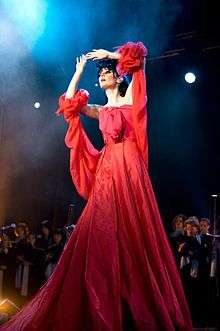Emma Shapplin
| Emma Shapplin | |
|---|---|
 | |
| Background information | |
| Birth name | Crystêle Madeleine Joliton |
| Born | 19 May 1974 |
| Origin | Savigny-le-Temple, France |
| Genres | |
| Years active | 1997–present |
| Labels | Nimue Music |
| Website |
www |
Emma Shapplin (born Crystêle Madeleine Joliton[1] on 19 May 1974, in the Paris suburb of Savigny-le-Temple[2]) is a French operatic coloratura soprano.
Revelation
- First lyric contact
Jump to fame
- Presentation in T.V. and Live concerts
- 1999, Vhile, Viña del Mar.
Style
- Influences
- style changes
Discography
Albums
- Carmine Meo (1997, Pendragon Records/EMI)
- Etterna (2002, Ark 21 Records/Universal Music Group)
- Macadam Flower (2009, Nimue Music/Universal Music Group/Sony Music).
- Dust Of a Dandy (2014)
Other releases
- Discovering Yourself (EP, 1999, Coeur De Lion)
- Spente le Stelle (Opera Trance) - The Remixes - Part One (Remix album, 2000, Radikal Records)
- The Concert in Caesarea (live DVD/CD, 2003, Pendragon Records/EMI)
- The Macadam Flower Tour - live concert in Athens DVD (June 2011)
Biography
Emma Shapplin, neoclassical artist, author, composer, and producer, started her music career in classical music but then moved to hard rock. When she was 18, singer Jean-Patrick Capdevielle convinced her to return to taking classical lessons so as to improve her singing technique. She discovered that although rock had given her more artistic freedom and hedonistic lifestyle than classical music, it was still not enough for her, so she decided to create her own style.[3] This became a combination of archaic opera and modern trance and/or pop music. Shapplin and Capdevielle subsequently worked together on her first release, Carmine Meo,[4] written by Capdevielle.

Although Shapplin was raised speaking French, and sings some of her songs in that language, most of the songs on Carmine Meo were translated from the French in which Capdevielle wrote them in into Latin and old Italian, in which Shapplin sang them.[5] On her second release, Etterna, she decided to perform in baroque (17th-century) Italian.[2] She did so because, according to her, "It's a language that sings naturally";[3] and because this is closer to the modern Italian language she used in some of her first classical singing lessons, while the older Italian "lends itself more to poetry, to dreaming, and to drama too".[6] In particular, she used the spelling "Etterna" for the album and track title because this is the way Dante wrote, rather than the modern Italian "Eterna".[2] She occasionally performs one of her hit songs, La Notte Etterna, in Spanish (as La Noche Eterna). Her single "Discovering Yourself" is in English. Shapplin has co-operated with Greek singer George Dalaras and she visits Greece almost every year for concerts in Athens' ancient Odeon of Herodes Atticus.
Shapplin was relatively unknown in the United States until composer Graeme Revell used her voice on his score for the movie Red Planet. They later collaborated on her second album Etterna, with Revell producing all of her songs.
Career

Shapplin most recently wrote and composed the album Macadam Flower, released late 2009., Macadam Flower combines electro-pop, rock, synth-pop, a touch of classical influences (marked in particular by JS Bach and Debussy), emphasizing sensuality, poetry and drama.[7]
Shapplin composed and wrote Macadam Flower herself, employing three languages (English, French and ancient Italian). Shapplin calls it “a new soundscape for the sensory experience.”[7]
The album is centered around a solitary fictional character, Maddalena Kean; a young woman residing in the metropolis of her childhood who is herself the macadam flower. The album tells the young woman's story through a collection of diverse melodies, lyrics, languages and musical arrangements, all of which Shapplin chose to express the varying moods of the character. As a modern figure, the young woman is the embodiment of an array of musical styles: electro-pop and soft rock together with classical styles borrowed from Claude Debussy, Jean-Sebastian Bach and popular melodies of Okinawa. Relying also on her passion for poetry, Shapplin said: “I wanted this album to be like a little bubble of softness and smoothness and to sometimes have a bit of the darker emotions with a different approach toward sensuality.”[8]
The live DVD of “The Macadam Flower Tour” was released in spring 2011.
References
- ↑ (Russian) / (French) Interview video with Emma Shapplin for the Russian TV channel TVC.
- 1 2 3 "Emma Shapplin: A Vocal and Commercial Phenomenon". FRI Musique. 17 January 2003. Retrieved 25 January 2009.
- 1 2 (English) English-language interview video with Emma Shapplin on the Etterna CD.
- ↑ "Emma Shapplin biographie". Archived from the original on 27 July 2008. Retrieved 26 January 2009.
- ↑ "Emma Shapplin biography". Retrieved 25 January 2009.
- ↑ (French) French-language interview video with Emma Shapplin on the Etterna CD.
- 1 2 Shapplin, Emma. "Marie Claire Russia Interview with Emma Shapplin". Retrieved 20 June 2011.
- ↑ Shapplin, Emma. "Marie Claire Russia Interview with Emma Shapplin".
External links
| Wikimedia Commons has media related to Emma Shapplin. |
- Official website
- Official Facebook
- (English) Emma Shapplin's biography
- (English) Emma Shapplin's discography
- (English) Emma Shapplin's album reviews
| ||||||||||
|